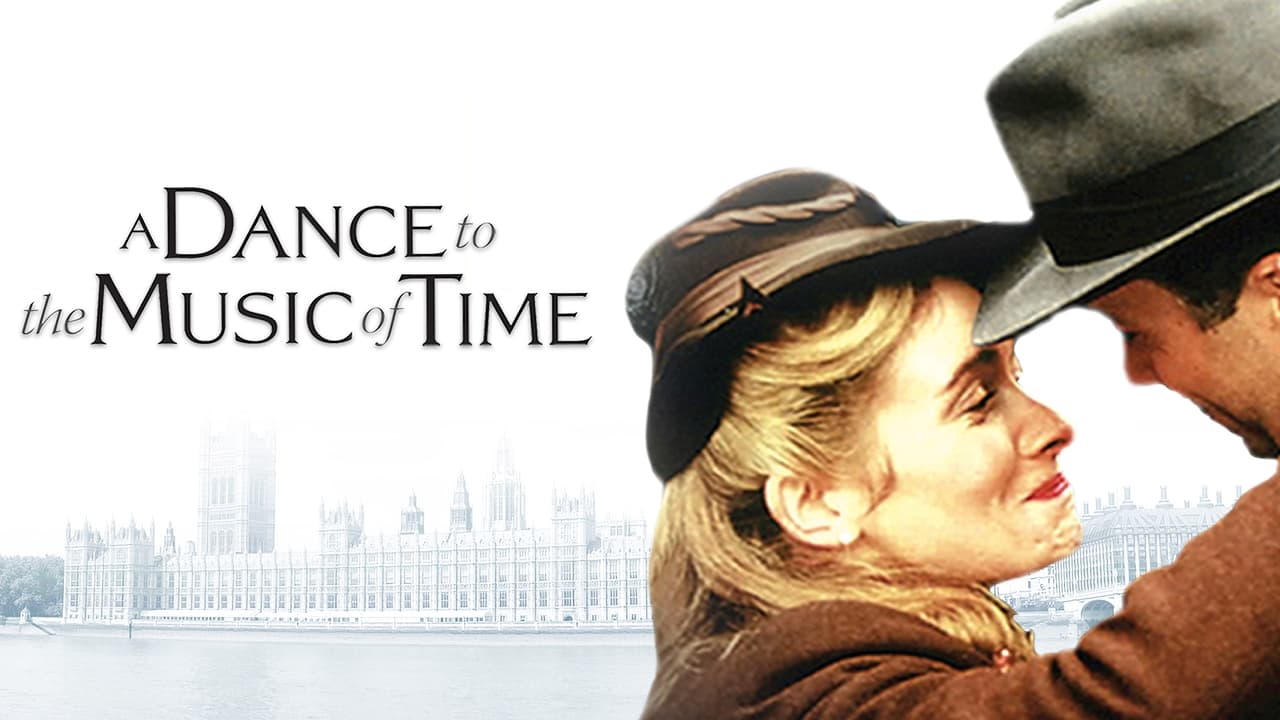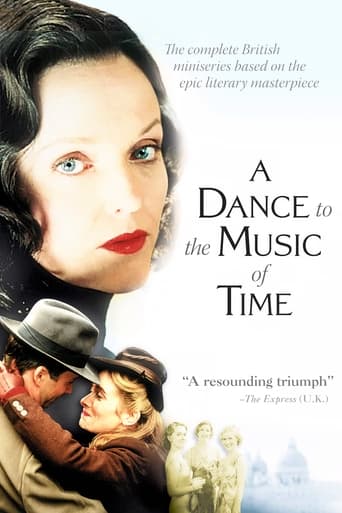

I spent the month of July reading Anthony Powell's 'A Dance to the Music of Time'; books that are uneven in quality but afford a long, fascinating read resulting in a strange poignance akin to but also quite different from Evelyn Waugh's war trilogy 'Sword of Honor'. Powell also seemed determined to out-Proust Proust but fails in that regard as Proust was a much better writer. Some have thought this to be Powell's version of Waugh's 'Brideshead Revisited'. I can see no correlation at all beyond, perhaps, the early scenes at Oxford and the drunken character of Charles Stringham who is vaguely reminiscent of Sebastian Flyte in Waugh's famous book.I have reached a point where I am no longer simply grateful for someone taking a stab at filming great or near-great literature. This adaptation of Powell's massive epic is so poorly done that I can find no mitigation for it having been attempted at all. I didn't expect much, even from a longish mini-series, but these books deserved detailed treatment, however many episodes it might have entailed. But the producer, Alvin Rakoff, either didn't have a clue as to the spirit of this story or was sorely curtailed in his budget. Given the often inept casting (something for which the producer is responsible) and the slipshod editing and hacking about of both the story line and the excision of many characters, I suspect the former case to be true. Mr Rakoff managed to miss the heart and soul of this tale and has merely created an interminable bore of a film.And the switch of actors in several roles was not only unnecessary but clumsily done. On the other hand, given the horrible make-up jobs on the characters of Mark Members and J.G. Quiggin who both look 100 years old when they are only in their 60s it is probably good that there weren't more characters to have to age in such a way.There are two performances that are absolutely true to the originals and they are Simon Russell Beale ('Persuasion') and Miranda Richardson who play Lord and Lady Widmerpool. There is no explanation for Pamela Flitton Widmerpool's behavior in the books and she is just as much an enigma in the film. It is terrible that Beale's amazing performance has been wasted on such a lousy screenplay.Most of the acting is very good, such as it is, but several performers are badly miscast. Paul Rhys is especially annoying as Charles Stringham, a man who is depressive but not a lobotomized, grinning buffoon. And poor Lord Erridge Warminster is turned into a goofy clown. Rakoff has added little political bits of his own for some reason; for instance, it was deemed necessary to include an attack on the Marxists in the demonstration by Oswald Mosley's Black Shirts. This is not in the book and adds nothing to the story. There are many other instances of wasted celluloid that would have been better utilized in telling the original story and creating rounded characters. Only Widmerpool and Pamela Flitton are rounded out, the rest are all cardboard cut-outs whose behavior makes little sense as a result.The producers also play fast and loose with time sequences. And characters run on for a scene or two and then vanish never to be seen again. This was even confusing to someone who knows the books!I doubt if I will live long enough to ever see this gargantuan tale presented as it should be so I'll have to stick to the books, which are fascinating. I have given this effort 3 stars, one for Beale, one for Richardson and one for production values which are high. No expense was spared on hiring out vintage automobiles and beautiful houses, not to mention a nice junket to Venice for the production team.Skip this piece of rubbish and try and find the books, if you can. Little Brown published them in a four book omnibus which can still be found from time to time on ABE.com. or if you are lucky and live in a large city, in a good used bookstore with a rare books section.This was a MAJOR disappointment even when I was prepared for a watered down version. I didn't think it could possibly be this bad. Reader's Digest would have been proud but the BBC should hang it's head in shame.
... View MoreI obtained this four DVD series from a local library. I saw it advertised in a catalog and recognized some of the performers so I thought it might be interesting. My impression was that the first three decades were almost totally divorced from the final decade. We liked the performance and narration by James Purefoy of the lead character Nick Jenkins but I felt the series would have ended satisfactorily when he returned from WWII to his wife and child. I stared in disbelief at the final episode when the main characters of Nick Jenkins, his wife Isobel and his former lover Jean were now all portrayed by different performers? I suspect the original actors might have read the script and wisely decided that sordid episode was not for them? Few of the characters in the final decade have any redeeming qualities whatsoever especially poor Pamela. You didn't care any longer about the fate of most of them. When you thought you have seen enough decadent characters, a new one shows up. Simon Russell Beale as Widmerpool managed to be be alternately amusing, pompous, entertaining, ambitious and comical during the first three episodes. In the final decade he became too pathetic to watch. I also felt there were far too many characters to try to keep track of with many popping in and out of the saga at different times with no apparent rhyme or reason.We really liked the first three decades, especially the music which represented accurately the mood of the times. When Jenkins entered the Ritz Hotal to meet with the ex-husband of his former mistress, the pianist was playing two Vera Lynn chestnuts- "Room 504" and "That Lovely Weekend" which I haven't heard since my WWII days. Perhaps, I enjoyed the music of the initial decades because so much of it was American and familiar. The final decade was totally devoid of any music which made it too ponderous and ugly to bear. My suggestion would be to enjoy the bravura performances and music of the first three episodes and terminate your viewing when Nick Jenkins returns home to his family to another Vera Lynn melody- "It's A Lovely Day Tomorrow." Spare yourself the discomfort of watching the tawdry final episode. Finally, much of the nudity was jarring and unnecessary and probably as embarrassing to the audience as it appeared to be to many of the characters.
... View MoreOnce again BBC show us the pride of British drama, giving us a full account of this incredible Anthony Powell saga. Not only does it contain a rich historical scenery, but also something of a philosophical clue of how life actually works. Starting off in Uni environment, we get to know young Nick Jenkins - a man in the middle in a circle of friends. Moving on in life is inevitably also a break up from this social network. As the inter war periods goes on, Nick meets his old friends (and friends of friends) in the most unexpected ways. Ever so slowly a pattern emerge, that is somehow life itself - we move around, get married, divorced, change political opinions in a series of shorter and longer encounters. As Poussin's painting has it - A Dance to the Music of Time. A true masterpiece.
... View MoreHands down, this is the best miniseries or film that I have ever seen. Everything about this miniseries was my cup of tea: the clothes, the scenery, the dialogue, the many handsome actors, just everything. I had broken down and bought myself one of those PAL video players as so many video tapes that I wanted to see were only available in PAL format. As an American NTSC videotape user, it was hard for me to reconcile the purchase of the special PAL VCR, until I saw this miniseries in all its glory. What an absolute confection! I wanted to be a part of the story. I find it hard to believe that this miniseries is not available to the American market in NTSC format. This miniseries far surpasses Brideshead Revisited, among others. Although Simon Russell Beal certainly did a phenomenal acting job, I also thought James Purefoy displayed alot of range and depth particularly in the difficult role of an observer narrator. I really can't say enough about how marvelous this miniseries was! It was worth every penny spent to see this miniseries!
... View More